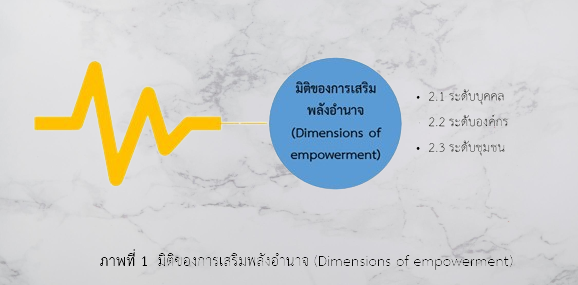Suwattanapong Romsri Empowerment Dynamics in Educational Organization Networks
Main Article Content
Abstract
DOI : 10.14456/pnuhuso.2024.21
Empowerment within educational organization networks is a multifaceted concept that encompasses various dimensions of agency, participation, and capacity building. This includes cooperation between schools, universities, and educational NGOs, which plays a crucial role in promoting empowerment at the individual, organizational, and community levels. The purpose of this article is to synthesize issues regarding empowerment dynamics in educational organization networks. This study focuses on the scholarly literature on empowerment within these networks, utilizing content analysis tools to conduct the analysis. The study identified several mechanisms for empowerment in educational organization networks: (1) collaboration and partnership building, (2) knowledge sharing and capacity building, (3) advocacy and collective action, and (4) leadership and governance structures. Additionally, it highlighted challenges and tensions in network empowerment, such as (1) power dynamics and inequalities, (2) resource allocation and sustainability, and (3) accountability and governance issues. In conclusion, the study underscores the importance of collaboration, advocacy, knowledge sharing, and leadership structures in fostering empowerment within educational organization networks, while also recognizing significant challenges like power dynamics, resource distribution, and accountability.
Article Details

This work is licensed under a Creative Commons Attribution-NonCommercial-NoDerivatives 4.0 International License.
References
Adams, D., & Velarde, J. (2018). Resource allocation and sustainability in educational networks. Journal of Educational Administration, 56(3), 345-359.
Avelino, F., Dumitru, A., Cipolla, C., Kunze, I., Wittmayer, J. (2022). Translocal empowerment in transformative social innovation networks. The Economics of Social Innovation. Routledge, 103-125. doi: 10.4324/9781003291510-7
Ball, S. J., Maguire, M., & Braun, A. (2012). How schools do policy: Policy enactments in secondary schools. Routledge.
Bandura, A. (1994). Self-efficacy. In V. S. Ramachaudran (Ed.), Encyclopedia of human behavior. Academic Press.
Bishop, R. (2007). Freeing ourselves from neo-colonial domination in research: A Kaupapa Maori approach to creating knowledge. In L. Brown & S. Strega (Eds.), Research as resistance: Critical, indigenous, and anti-oppressive approaches (pp. 97-126). Canadian Scholars' Press.
Bovens, M. (2007). Analyzing and assessing accountability: A conceptual framework. European Law Journal, 13(4), 447-468.
Bronfenbrenner, U. (1979). The ecology of human development: Experiments by nature and design. Harvard University Press.
Bryson, J. M., Crosby, B. C., & Stone, M. M. (2006). The design and implementation of cross-sector collaborations: Propositions from the literature. Public Administration Review, 66(s1), 44-55.
Bryson, J. M., Crosby, B. C., & Stone, M. M. (2015). Designing and implementing cross-sector collaborations: Needed and challenging. Public Administration Review, 75(5), 647-663.
Crenshaw, K. (1989). Demarginalizing the intersection of race and sex: A Black feminist critique of antidiscrimination doctrine, feminist theory, and antiracist politics. University of Chicago Legal Forum, 139-167.
Edwards, M. (2005). Civil society. Polity.
Freire, P. (1970). Pedagogy of the oppressed. Herder and Herder.
Giroux, H. A. (1988). Teachers as intellectuals: Towards a critical pedagogy of learning. Bergin & Garvey Publishers.
Gutierrez, L. M., Parsons, R. J., & Cox, E. O. (1995). Empowerment in social work practice: A sourcebook. Brooks/Cole Publishing Company.
Hargreaves, A., & Fullan, M. (2012). Professional capital: Transforming teaching in every school. Teachers College Press.
Hooks, b. (1984). Feminist theory: From margin to center. South End Press.
Keck, M. E., & Sikkink, K. (1998). Activists beyond borders: Advocacy networks in international politics. Cornell University Press.
Miles, M. B., & Huberman, A. M. (1994). Qualitative data analysis: An expanded sourcebook (2nd ed.). Sage Publications.
Mitra, D. (2018). Community-driven development: A critical approach to theory, policy, and practice. Anthem Press.
Orr, D. W. (1992). Ecological literacy: Education and the transition to a postmodern world. State University of New York Press.
Ostrom, E. (1990). Governing the commons: The evolution of institutions for collective action. Cambridge University Press.
Patriani, I., Trustisari, H., Parmawati, S., Nugrahanti, T.P., Kespandiar, T. (2023). Network Society: Digital Empowerment or Disempowerment. Al Qalam, 17(1), 161-161. doi: 10.35931/aq.v17i1.1795.
Provan, K. G., & Kenis, P. (2008). Modes of network governance: Structure, management, and effectiveness. Journal of Public Administration Research and Theory, 18(2), 229-252.
Putnam, R. D. (2000). Bowling alone: The collapse and revival of American community. Simon & Schuster.
Rappaport, J. (1987). Terms of empowerment/exemplars of prevention: Toward a theory for community psychology. American Journal of Community Psychology, 15(2), 121-148.
Rhodes, R. A. W. (1996). The new governance: Governing without government. Political Studies, 44(4), 652-667.
Rincón-Gallardo, S., & Fullan, M. (2016). Essential features of effective networks in education. Journal of Professional Capital and Community, 1(1), 5-22.
Sen, A. (1999). Development as freedom. Oxford University Press.
Shor, I. (1992). Empowering education: Critical teaching for social change. University of Chicago Press.
Spillane, J. P., Halverson, R., & Diamond, J. B. (2004). Towards a theory of leadership practice: A distributed perspective. Journal of Curriculum Studies, 36(1), 3-34.
Spreitzer, G. M. (1995). Psychological empowerment in the workplace: Dimensions, measurement, and validation. Academy of Management Journal, 38(5), 1442-1465.
Vangen, S., & Huxham, C. (2003). Nurturing collaborative relations: Building trust in inter-organizational collaboration. The Journal of Applied Behavioral Science, 39(1), 5-31.
Zimmerman, M. A. (1995). Psychological empowerment: Issues and illustrations. American Journal of Community Psychology, 23(5), 581-599.


